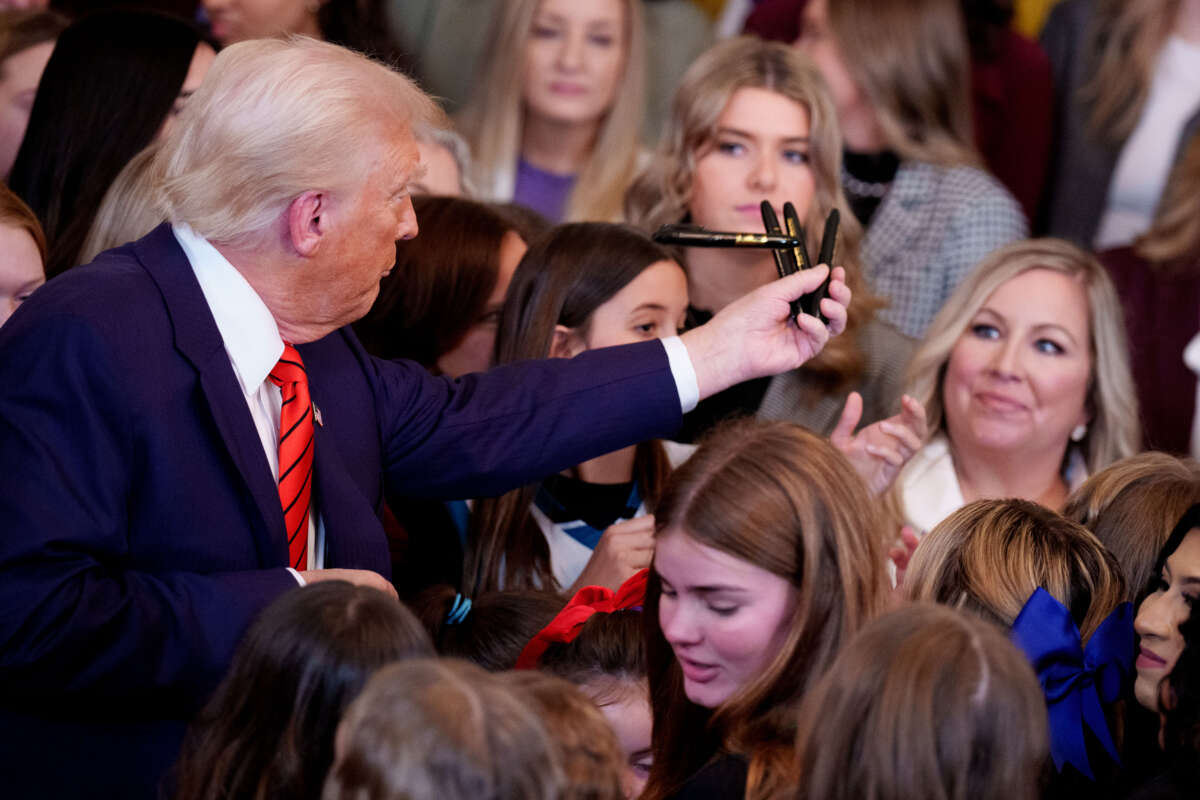Support justice-driven, accurate and transparent news — make a quick donation to Truthout today!
The U.S. Department of Education has opened investigations into San Jose State University’s volleyball team, the University of Pennsylvania’s swimming program, and the Massachusetts Interscholastic Athletic Association over possible Title IX violations related to transgender athletes. The department has also said that it is reviewing sports policies at other institutions.
“These frivolous investigations are meant to serve as fear tactics to ensure future compliance from universities,” LGBTQ legislative researcher Allison Chapman told Truthout.
The investigations follow President Donald Trump’s anti-trans executive order barring transgender athletes from competing in women’s sports. The order directs federal agencies to penalize schools and athletic organizations that permit transgender people’s participation, arguing that such policies violate Title IX, the federal law prohibiting sex-based discrimination in education.
Critics, however, say the move is less about protecting women’s sports and more about restricting transgender rights. “This bill is framed as protecting women and girls’ rights, when it does anything but that,” Shiwali Patel, senior director of Safe and Inclusive Schools at the National Women’s Law Center, said in a statement.
Concerningly, the Education Department’s actions do not appear to be based on formal complaints and the agency also seems to be examining past policies, raising questions about whether it is retroactively enforcing the new directive — which would be an unusual departure from standard practice. In fact, the department’s investigation into the University of Pennsylvania seems to center on Lia Thomas, a former member of the university’s women’s swim team who graduated in 2022.
“If there wasn’t evidence of wrongdoing years ago when these situations occurred, there will not be any now,” Chapman said. “This is just a transphobic witch hunt using taxpayer dollars.”
The legal authority of the department’s actions is also unclear in at least one case. The Massachusetts Interscholastic Athletic Association, as a state athletic league, does not typically receive direct federal education funding, which raises questions about whether the Department of Education even has the authority to investigate it.
The NCAA Board of Governors has also responded to Trump’s sports ban by cracking down on transgender athletes. Under a revised policy, competition in women’s sports is now restricted to cisgender athletes. The organization had been previously criticized for its transphobic policies but had permitted trans women to compete on women’s teams for the past 15 years with limitations.
Trump’s anti-trans sports ban is part of a larger effort by the Trump administration to roll back transgender rights and anti-discrimination protections. In addition to the sports ban, Trump has issued executive orders defining sex as strictly male or female based on biological characteristics at conception, barring transgender people from serving in the military, cutting federal funding to medical institutions that provide gender-affirming care to minors, discriminating against trans students in K-12 schools, and dismantling diversity, equity, and inclusion (DEI) initiatives.
These actions have been implemented rapidly. In January, the Department of Justice (DOJ) directed its Civil Rights Division to halt ongoing litigation related to civil rights protections, raising concerns among civil and human rights advocates that the administration is using federal civil rights laws to target the very groups they were originally designed to protect. Attorney General Pam Bondi reinforced this approach in a recent memo directing DOJ divisions to enforce Trump’s anti-DEI executive order. The memo stated that the DOJ would work with the Department of Education to ensure that universities comply with the administration’s new anti-DEIA mandate.
The policy shifts have also already led to direct interventions in schools. Last month, the Department of Education launched an investigation into Denver Public Schools (DPS) after students at East High School helped establish an all-gender, multi-stall restroom. The department’s complaint alleges that the restroom “discriminates against students on the basis of sex,” reflecting the Trump administration’s anti-trans interpretation of Title IX.
Although legal experts have emphasized that these anti-trans executive orders are not yet law, there has been widespread preemptive compliance by hospitals, employers and federal agencies — but some school systems have resisted, according to transgender journalist Erin Reed. In fact, despite the Trump administration’s anti-trans investigation into DPS, the school district has said that it remains “committed to educational equity, and we will continue to honor the needs of our students.”
While K-12 schools that allow transgender girls to compete on girls’ sports teams risk losing federal funding under Trump’s anti-trans “Ending Radical Indoctrination In K-12 Schooling” executive order, transgender advocates hope that school systems will fight to protect their transgender student-athletes.
“Schools have the responsibility of standing up for their students and should push back against these orders,” Chapman said. In fact, while resisting these anti-trans policies could risk a school’s federal funding and trigger investigations by the Department of Education, complying with them may violate state anti-discrimination laws.
While the exact number of transgender student-athletes is unknown, a 2019 survey by the Gay, Lesbian and Straight Education Network (GLSEN) found that 5 percent of high school students participated in a sport that aligned with their gender identity. A 2022 report by the Williams Institute estimated that approximately 300,000 high school-aged students (ages 13-17) identify as transgender, which means that potentially 15,000 students could be impacted if schools begin enforcing Trump’s anti-trans sports ban.
Speaking against the authoritarian crackdown
In the midst of a nationwide attack on civil liberties, Truthout urgently needs your help.
Journalism is a critical tool in the fight against Trump and his extremist agenda. The right wing knows this — that’s why they’ve taken over many legacy media publications.
But we won’t let truth be replaced by propaganda. As the Trump administration works to silence dissent, please support nonprofit independent journalism. Truthout is almost entirely funded by individual giving, so a one-time or monthly donation goes a long way. Click below to sustain our work.
